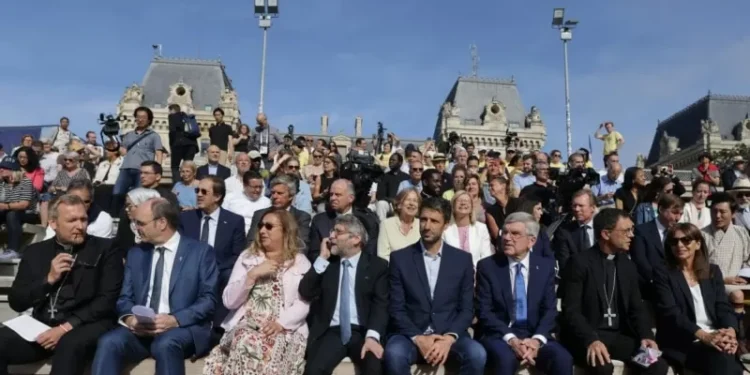PARIS – On Sunday morning, faith leaders from different religions gathered in front of the iconic Notre Dame Cathedral in Paris to celebrate the harmonious relationship between faith and sport. This event, organized by the International Olympic Committee (IOC) President Thomas Bach, kicked off the 2024 Paris Games with a message of unity and peace.
The Paris Games faced some criticism from religious groups, including the Vatican, for a scene in the opening ceremony that was seen as mocking Christianity. However, the artistic director and performers denied any intention of disrespect and stated that the focus was on promoting peace. This interfaith gathering, modeled after the first one organized by the founder of the modern Olympics, Pierre de Coubertin, in 1924, aimed to bring together different faiths and highlight the shared values of respect, tolerance, and acceptance.
Far from the controversies, located in an inconspicuous tent at the end of the athletes’ village, representatives of the five major global religions – Buddhism, Christianity, Hinduism, Islam, and Judaism – have set up a shared hall. This space serves as a place for athletes and their staff to seek spiritual guidance and find information about worship.
As the pressure for competition mounts, many athletes have found solace in this space during the first half of the Games. According to Reverend Jason Nioka, a former judo champion and in-charge of the largest contingent of Olympic chaplains, athletes come to pray to release their pressure and find a moment of peace in the midst of the chaos.
The chaplains, consisting of about 40 Catholic priests, nuns, and lay faithful, have worked tirelessly for months to set up this space while ensuring compliance with France’s secularism laws. Each religion was allotted 50 square meters of space, and the faith leaders have beautifully decorated the rooms to symbolize dialogue, tolerance, and acceptance. The Muslim and Jewish spaces are connected by an open door, portraying the message of unity and conviviality.
Rabbi Moshe Lewin, the vice president of the Conference of European Rabbis and one of the Jewish chaplains, explains, “Here it’s very symbolic. The conviviality, that’s the image that we should transmit.” Najat Benali, the president of the Coordination of Muslim Associations of Paris and the leader of the Muslim chaplaincy, adds, “We do ‘geo-fraternity,’ not geopolitics.” This highlights the shared mission of promoting peace and unity through sports and faith.
The Hindu space also reflects the importance of blessings and chanting in their faith, with a small water fountain and chanting resounding from a volunteer’s cellphone. It is the most vibrant and colorful space, adorned with statues from India and a recreated temple structure. The Christian area, in the middle, houses Catholics, Protestants, and Orthodox worshippers. They all share one altar with a large Bible, flanked by a cross and icons. Next to it hangs a poster with a faith-inspiring quote by U.S. star gymnast Simone Biles.
During the first week of the Games, three track and field competitors from Australia, Finland, and Jamaica walked into the shared hall to pray, and the faith leaders welcomed them with open arms. Anne Schweitzer, who is coordinating about three dozen Protestant chaplains, describes the experience as “a little Pentecost.” She also mentions that she discovered one of the athletes, a silver medalist, is quoted in the Gospel edition called “More Precious than Gold,” created specifically for the Games and available to visitors in the shared hall and churches across Olympic host cities.
The faith leaders are not the only ones making use of this shared space. Some Catholic athletes and volunteers have also visited the Buddhist space to seek meditation and peace. Luc Charles, a Zen monk with the Buddhist Union of France, expresses, “It’s the occasion to get to know each other better.” This space has not only brought together different faiths but has also fostered understanding and respect among them.
In a time where the world is riddled with division and conflicts based on religion, the 2024 Paris Games have reminded us of the power of faith to unite and promote peace. The message of this gathering is a testament to the fact that faith and sports can complement each other and bring people together. As the Paris Games continue, we hope that this spirit of unity and acceptance will prevail, both on and off the field.







